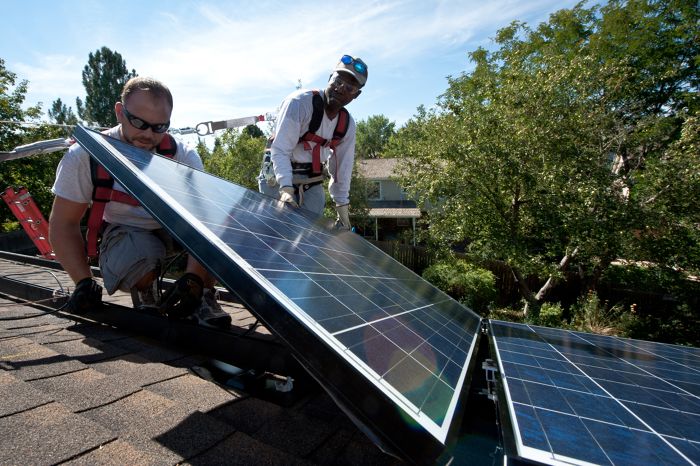
Wisconsin utility regulators have approved changes in net-metering rules proposed by the state’s largest electric utility that will lower the compensation for excess electricity sold to the grid, and change bookkeeping rules so homeowners with photovoltaic (PV) and wind systems can’t carry solar credits for more than a month.
We Energies says the new rate structure spreads the costs of maintaining the grid more evenly. Solar advocates say the changes will dampen interest in renewable energy.
In reporting on that and other recent rate cases, Midwest Energy News said a challenge to the orders from the state’s Public Service Commission is likely.
If the new rate structures aren’t revised, they will go into effect next January. Customers with existing net-metering contracts, however, will be grandfathered for 10 years.
Impact on net-metered customers
Customers who sign new net-metering contracts now will have a less-attractive deal than existing customers in two ways.
First, the utility will “true up,” or clear the books at the end of each month, rather than allowing credits for electricity sold to the utility to accumulate for the entire year.
“It definitely is not reflective of best practices to switch from annual to monthly,” Sara Baldwin Auck, regulatory program director of the Interstate Renewable Energy Council, told Energy News.
The impact will be most obvious in the spring and fall, two shoulder seasons where PV arrays can pile up solar credits because panels are productive, and heating and cooling loads are relatively low, Energy News said. With an annual-accounting arrangement, credits earned then would offset higher demands in winter and summer. The new rules mean an end to that arrangement.
The other key decision was a change in the compensation for net-metered customers from the retail rate of about 14 cents per kwh to the wholesale rate of between 4 cents and 5 cents per kwh, depending on whether rates were paid at peak or off-peak hours, We Energies spokesman Brian Manthey said by telephone.
In addition, fixed charges (what the utility calls the “facilities charge”) will rise from $9 to $16 for all residential customers, while energy charges (the charges based on volume) drop slightly from 14 cents to 13 cents per kWh.
The new net-metering rates apply to systems with capacities of 20kw or less and only to those who own their solar arrays (leased solar is not allowed in Wisconsin).
Manthey said We Energies has between 750,000 and 800,000 residential customers in the state, and less than 1000 of them own PV systems. With solar customers making up such a low percentage of the total residential market, the rate changes are not so much about costs to the utility now, but what is possible as small solar and distributed generation (DG) systems continue to gain steam.
DG customers should pay their “fair share”
Wisconsin is one of many states where utility regulators are wrestling with questions of how to bring more renewable energy on the grid, and the arguments in this case strike familiar themes.
We Energies argues that customers with their own generating capacity “contribute less than their equitable share” to the utility’s fixed costs of producing and transmitting the power because fixed costs are recouped through energy charges.
“[We Energies] argued that this produces an unreasonable intra-class cross-subsidy borne by customers who do not own DG systems,” the commission said in its decision.
In agreeing with the utility’s arguments, the commission wrote:
“These new tariffs are fair, both to those with DG and to those without. This restructuring moves [We Energies] a step closer to more appropriately aligning costs and fairly compensating customers that generate a portion of their electricity needs without increasing costs to those who cannot or do not do so.”
Intervenors argued that higher net-metering rates should continue because of the “purported societal benefits of distributed generation.” But the commission said there wasn’t enough on the record to support the claim: “The text of the law clearly shows the Commission is not bound to support renewable-energy development at the cost of all other ratemaking principles or public-policy goals.”
Commissioners also took issue with claims by intervenors that rate changes were premature because there are so few customers now who are capable of generating some of their own electricity.
“However, it is precisely for that reason that it is reasonable to restructure [the utility’s] DG tariff offerings now,” the decision reads. “The Commission finds, based upon the facts and as a matter of public policy, that there are utility fixed costs that are not being borne by DG customers and a change should be made now before those costs grow with increased adoption of DG.
“The use of DG is expected to continue to increase and it is important for those making such investments to understand the real costs and benefits of those investments and make informed choices.”
In Indiana, utilities make the same pitch
The same arguments also are being played out in Indiana, according to an article posted at IBJ.com, the website of the Indianapolis Business Journal.
There, the House chairman of the Legislature’s Utilities and Energy Committee has proposed changes in net-metering rules that would allow utilities to pay the avoided cost rather than retail rates for excess power purchased from customers.
Other provisions, UtilityDive.com reports, would allow utilities to add a fixed DG charge for customers with wind and solar systems (with regulatory approval) and permit utilities to begin charging a fee to hook up renewable-energy systems to the grid (also with regulatory approval).
The head of a trade group representing investor-owned gas and electric utilities in the state said existing net-metering rules aren’t fair because they require utilities to pay three times as much for electricity as they would on the open market, the website said.
Joe Bowling, the executive director of a local community-development group in Englewood where solar panels have been installed on an office roof, ridiculed utility claims. He said they were like Wal-Mart complaining about people who grow vegetables in their backyards but also shop at grocery stores, and then asking for a law requiring those people to sell their produce to Wal-Mart at wholesale prices, IBJ said.
“That’s unjust. That’s monstrous. That’s evil,” he said. “We ought not to stand for it. We would not stand for it if it were a food issue. Because energy stuff is so mysterious and makes people’s eyes glaze over, you can get away with just about anything.”
There are less than 1000 net-metered customers in the state now, the report said.
The bill also would make it legal to lease solar-energy systems in the state, and create disclosure rules and other measures designed to protect consumers, two provisions its sponsor said aren’t getting much attention.
Fine Homebuilding Recommended Products
Fine Homebuilding receives a commission for items purchased through links on this site, including Amazon Associates and other affiliate advertising programs.

Reliable Crimp Connectors

8067 All-Weather Flashing Tape

Handy Heat Gun

In Wisconsin, advocates of solar energy say changes in net-metering rules will mean lower financial returns. The state's largest utility says the changes make rates fair for everyone.






















